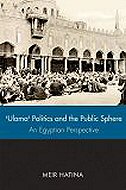|
''Ulama'', Politics, and the public Sphere: An Egyptian Perspective
|
|
Meir Hatina
|

|

The current status of the Sunni 'ulama', or religious scholars, has attracted renewed academic interest during the last decade in light of their assertiveness regarding moral and sociopolitical issues on the Arab-Muslim agenda. This vitality has been attributed to the Islamic resurgence from the 1970s onward, which forced the political elites to rely increasingly on the religious establishment, thereby allowing the 'Ulama' greater freedom of activity.
The present study, however, returns to an earlier period in history and shows that such vitality is not new. Its roots go back to the late nineteenth century, an accelerated period of state building and national cohesion.
The sustained efforts of the 'ulama' to restrain the nationalist/modernist impetus, the study further argues, facilitated a more convenient climate for dissident Islamic movements to further their cause.
Meir Hatina is a senior lecturer in the Department of Islamic and Middle Eastern Studies, the Hebrew University of Jerusalem.
|
|
